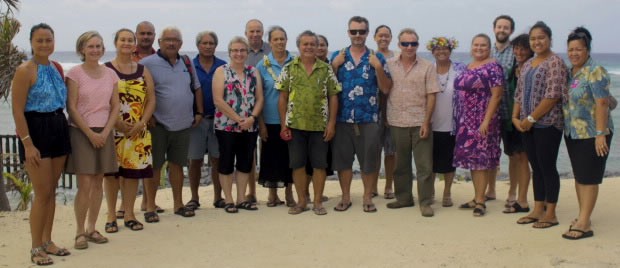The Pacific Science for Health Literacy Project (PSHLP) team started the year with a workshop supporting teachers to empower young people to “be the change” as they explore the challenges of obesity, heart disease and type 2 diabetes in the Cook Islands.
Funded by NZAid, PSHLP brings together the Ministry of Health, Ministry of Education in the Cook Islands and the University of Auckland’s Liggins Institute to provide programmes linking to science, social studies, health and PE and English that empower young people to explore the evidence and be agents of change for their families and the community.
Teachers and Public Health staff explored feedback from participating students. They learnt that the most valuable part of the programme for Year 11 students was being able to explore actual health data from the Cook Islands.
“If we had not seen this we would not know about how diabetes is affecting our population.” Year 11 student
To ensure students in 2016 will be able to explore the latest evidence Tania Avare from Public Health updated teachers with the latest STEPS data. With increasing rates of adult overweight, obesity and diabetes this community-wide challenge is not getting easier. Tania also shared data showing that overweight and obesity in primary and secondary students is similarly increasing.
The workshop heard that students want to make changes in their diet and lifestyle as a result of exploring the evidence – but are challenged by issues such as lack of sports opportunities for the ‘not so sporty’ and the cost of food.
“My Aunty bought 4 oranges and it was $16 – so like $4 each. Imagine what you can buy – how many corned beef for $16. That is why people do not eat fruit because it is very expensive compared to things like corned beef.” Year 11 student
Focus groups revealed that while students loved playing sports such as netball when they were younger, they feel there is no place for them now as they are “not good enough for the teams”. Comments also highlighted the maturity of Year 11 students, who noticed that the long working hours their parents put in make it difficult for many adults to get regular exercise.
Associate Professor Mark Vickers, a scientist at the Liggins Institute whose work helping to understand how we can reduce obesity and diabetes rates is explored in the learning programmes, was in Rarotonga for the week to work with the team. Mark took participants on a ‘deep dive’ into the science behind why changing eating and exercise habits in children and adolescents is key to addressing the obesity epidemic. Mark’s work has shown that the food both mum and dad eat before a pregnancy, as well as what mum eats during the pregnancy and what mum and dad feed their children has a very strong impact on the risk of the children developing obesity and diabetes later in life. Combined with evidence that we develop habits for life as teenagers, the workshop heard a very clear message that young people, if they are supported, hold the key to better health for our population.
The workshop finished with evidence of the positive impact of the programme on student learning. Delaney Yaqona, Deputy Principal of Nukutere College explained how by linking learning in English, Science and Māori, Year 11 students had used their exploration of Te Maki Toto Vene to support NCEA achievement standards in all three subjects. Ina Herrmann, Director of Learning and Teaching at the Ministry of Educatuin encouraged teachers to make the links between the real world and the classroom as we know this will support young people to engage in schooling and become life-long learners.
The next workshop will be held in early May.





